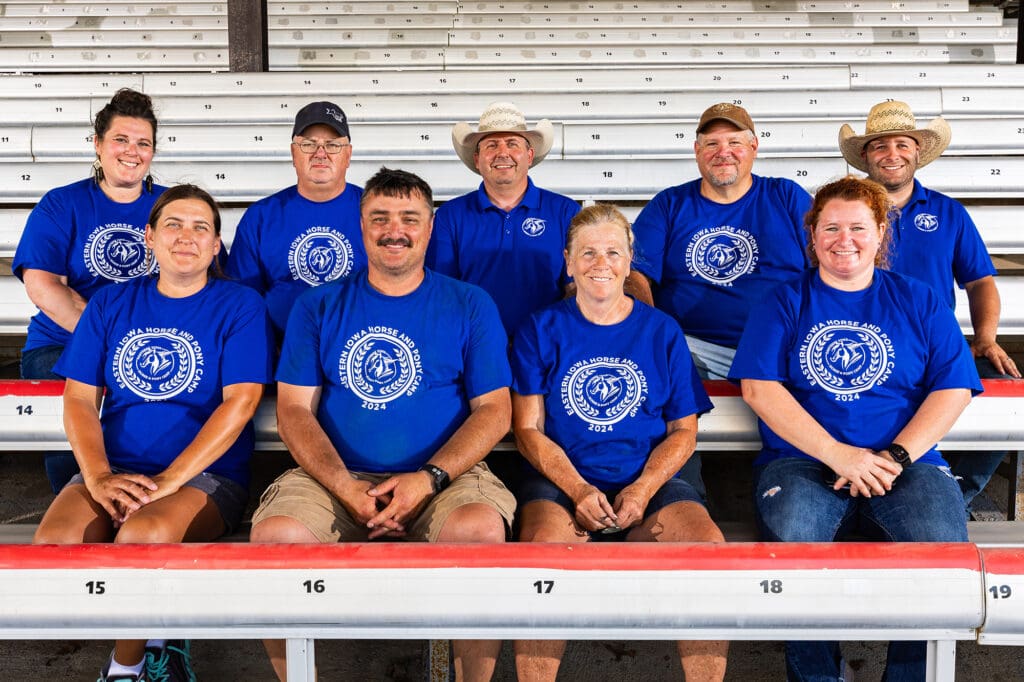ABOUT US
The annual camp known as, Horse & Pony Camp, began in 1969 and was held for two years in Galena, IL. In 1971, the camp was moved to the Dubuque County Fairgrounds and renamed the Dubuque County Trailblazers 4-H Horse & Pony Camp. The camp closed in 2013 and in the summer of 2014, it was decided to form a new non-profit organization that would take over the responsibility of managing this summer youth camp. The Eastern Iowa Horse & Pony Camp, Inc. (EIHPC) was formed. Camp was held from 2015-2019 in Dubuque and moved to our new location, the Great Jones County Fairgrounds, in 2021. We are honored to carry on the rich tradition and history of the “Old Horse and Pony Camps”.
The annual camp known as, Horse & Pony Camp, began in 1969 and was held for two years in Galena, IL. In 1971, the camp was moved to the Dubuque County Fairgrounds and renamed the Dubuque County Trailblazers 4-H Horse & Pony Camp. The camp closed in 2013 and in the summer of 2014, it was decided to form a new non-profit organization that would take over the responsibility of managing this summer youth camp. The Eastern Iowa Horse & Pony Camp, Inc. (EIHPC) was formed. Camp was held from 2015-2019 in Dubuque and moved to our new location, the Great Jones County Fairgrounds, in 2021. We are honored to carry on the rich tradition and history of the “Old Horse and Pony Camps”.

BOARD OF DIRECTORS
Ben Urbain
President
Jason Burke
Vice President
Michael Wolken
Treasurer
Jessica Hingtgen
Secretary
Brooke Balichek
Director
Matt King
Director
Katie Kotz
Director
Sue Manternach
Director
Nick Meyer
Director
Iowa Code Chapter 673
WARNING: Under Iowa law, a domesticated animal professional is not liable for damages suffered by, an injury to, or the death of a participant resulting from the inherent risks of domesticated animal activities, pursuant to Iowa Code Chapter 673. You are assuming inherent risks of participating in this domesticated animal activity. A number of inherent risks are associated with a domesticated animal activity. A domesticated animal may behave in a manner that results in damage to property or an injury or death to a person. Risks associated with the activity may include injuries caused by bucking, biting, stumbling, rearing, trampling, scratching, falling, or butting. The domesticated animal may react unpredictably to conditions, including, but not limited to, a sudden movement, loud noise, and unfamiliar environment, or the introduction of unfamiliar persons, animals, or objects. The domesticated animal may also react in a dangerous manner when a condition or treatment is considered hazardous to the welfare of the animal; a collision occurs with an object or animal; or a participant fails to exercise reasonable care, take adequate precautions, or use adequate control when engaging in a domesticated animal activity, including failing to maintain reasonable control of the animal or failing to act in a manner consistent with the person’s abilities.
Iowa Code Chapter 673
WARNING: Under Iowa law, a domesticated animal professional is not liable for damages suffered by, an injury to, or the death of a participant resulting from the inherent risks of domesticated animal activities, pursuant to Iowa Code Chapter 673. You are assuming inherent risks of participating in this domesticated animal activity. A number of inherent risks are associated with a domesticated animal activity. A domesticated animal may behave in a manner that results in damage to property or an injury or death to a person. Risks associated with the activity may include injuries caused by bucking, biting, stumbling, rearing, trampling, scratching, falling, or butting. The domesticated animal may react unpredictably to conditions, including, but not limited to, a sudden movement, loud noise, and unfamiliar environment, or the introduction of unfamiliar persons, animals, or objects. The domesticated animal may also react in a dangerous manner when a condition or treatment is considered hazardous to the welfare of the animal; a collision occurs with an object or animal; or a participant fails to exercise reasonable care, take adequate precautions, or use adequate control when engaging in a domesticated animal activity, including failing to maintain reasonable control of the animal or failing to act in a manner consistent with the person’s abilities.